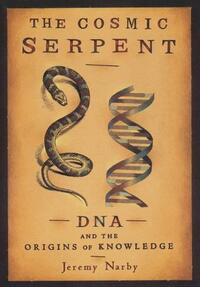Take a photo of a barcode or cover
Narby's book doesn't perhaps have the most compelling narrative - he traces quite a 'serpentine' path through science, anthropology, evolutionary biology, etc, and whilst these observations are frequently fascinating and thought provoking, they don't especially make for a coherent 'story'.
But it's Narby's overall hypothesis which is most intriguing. The shamans of the Amazon - along with other native cultures - profess a detailed knowledge of botany and the effects of various psychotropic substances that is difficult to account for rationally. This, of course, is a disputable claim, but if true it demands an answer: How did they come by such knowledge? But it is an answer that, Narby argues, traditional anthropology and science are not in a position to provide.
Narby's proposed solution is that we should take the claims of the shamans seriously: they say that 'the spirits tell them', so why not believe them? But 'spirits', in Narby's interpretation, are not the traditional immaterial entities of myth and religion, but the mechanism of life itself - specifically, DNA. Highlighting the prevalence of serpent symbolism in shamanic cultures (especially in the Amazon), Narby argues that shamans have found a means to 'interrogate' the information held in DNA (the snake-like double helix), and in fact to 'converse' with it. In his words, the biosphere which is controlled and moulded by DNA is 'minded' - it is conscious and intelligent.
It is to Narby's credit that, whilst endeavouring to make his case in robust scientific terms, he recognises that his argument will do nothing to convince the harder-headed type of scientist and rational sceptic, considering their world view to be inherently opposed to his hypothesis. Here, he makes some good observations, I think, concerning how the method and principles of modern scientific materialism (of which Darwinism is an expression) necessarily exclude a number of intriguing possibilities: that nature is conscious and purposive; that - even if we are not talking of divine design - there may be other principles at work in evolution than the mechanistic theory of natural selection (which he considers woefully inadequate to account for biological complexity and intentionality).
This is, obviously, an unpopular view (the majority of evolutionary biologists being firmly in the mechanistic/materialistic Darwinian camp). Add to this Narby's openness to the meaningfulness of shamanic-type hallucinogenic experiences, and it is easy to see how the book will be summarily dismissed or ignored by those who would be best placed to consider his arguments (biologists, anthropologists, scientists in general). However, this would be a great shame. This is far from a 'quack' book. Narby is personally and passionately invested in the issues he raises - he talks hallucinogens himself, under supervision of a native shaman, and through his involvement in the indigenous culture he comes to realise the threats and dangers they face from Westernisation and the exploitation of big business. Furthermore, his sincere and thoughtful appraisal of the topics raised, always seeking to phrase his ideas in the terms of science and rational discourse, make this a valuable contribution not only to literature on shamanism and hallucinogenics, but also to those seeking to appraise the biases of science and the Western perspective.
Gareth Southwell is a philosopher, writer and illustrator.
But it's Narby's overall hypothesis which is most intriguing. The shamans of the Amazon - along with other native cultures - profess a detailed knowledge of botany and the effects of various psychotropic substances that is difficult to account for rationally. This, of course, is a disputable claim, but if true it demands an answer: How did they come by such knowledge? But it is an answer that, Narby argues, traditional anthropology and science are not in a position to provide.
Narby's proposed solution is that we should take the claims of the shamans seriously: they say that 'the spirits tell them', so why not believe them? But 'spirits', in Narby's interpretation, are not the traditional immaterial entities of myth and religion, but the mechanism of life itself - specifically, DNA. Highlighting the prevalence of serpent symbolism in shamanic cultures (especially in the Amazon), Narby argues that shamans have found a means to 'interrogate' the information held in DNA (the snake-like double helix), and in fact to 'converse' with it. In his words, the biosphere which is controlled and moulded by DNA is 'minded' - it is conscious and intelligent.
It is to Narby's credit that, whilst endeavouring to make his case in robust scientific terms, he recognises that his argument will do nothing to convince the harder-headed type of scientist and rational sceptic, considering their world view to be inherently opposed to his hypothesis. Here, he makes some good observations, I think, concerning how the method and principles of modern scientific materialism (of which Darwinism is an expression) necessarily exclude a number of intriguing possibilities: that nature is conscious and purposive; that - even if we are not talking of divine design - there may be other principles at work in evolution than the mechanistic theory of natural selection (which he considers woefully inadequate to account for biological complexity and intentionality).
This is, obviously, an unpopular view (the majority of evolutionary biologists being firmly in the mechanistic/materialistic Darwinian camp). Add to this Narby's openness to the meaningfulness of shamanic-type hallucinogenic experiences, and it is easy to see how the book will be summarily dismissed or ignored by those who would be best placed to consider his arguments (biologists, anthropologists, scientists in general). However, this would be a great shame. This is far from a 'quack' book. Narby is personally and passionately invested in the issues he raises - he talks hallucinogens himself, under supervision of a native shaman, and through his involvement in the indigenous culture he comes to realise the threats and dangers they face from Westernisation and the exploitation of big business. Furthermore, his sincere and thoughtful appraisal of the topics raised, always seeking to phrase his ideas in the terms of science and rational discourse, make this a valuable contribution not only to literature on shamanism and hallucinogenics, but also to those seeking to appraise the biases of science and the Western perspective.
Gareth Southwell is a philosopher, writer and illustrator.
adventurous
inspiring
mysterious
medium-paced
adventurous
hopeful
informative
mysterious
fast-paced
inspiring
mysterious
fast-paced
If you know, you know. If you don’t and it’s not for you, move along.
challenging
informative
inspiring
reflective
medium-paced
adventurous
informative
inspiring
mysterious
reflective
fast-paced
A humble and curious exploration of knowledge. Beyond the factual and hypothetical questions, Narby offers tools to frame questions, knowledge, scientific practice and dogma, and approach vital questions from new lenses.
Will be thinking about this one for a while.
Will be thinking about this one for a while.
informative
slow-paced
Informative and speculative on the origins of life and the connection between the metaphysical and the science.
There is only one way for me to describe how I feel after reading this book- what the actual fuck.
I picked this book up on my birthday, on a little trip to York, in a very stuffy bookstore. The front cover looked interesting. As a biology-obsessed student. 'The Cosmic Serpent- DNA and the origins of knowledge' is a title that just can't be missed. I turned it over, skimmed over the blurb at the back and I was immediately sold. "The evidence he collected- on subjects as diverse as molecular biology, shamanism, neurology and ancient mythology"- say less! I was a promised an untold story of DNA- I was ready for unconventional, but I expected it to be realistic.
Instead I was met with the biased ramblings of a man, who experienced ayahuasca and has an obsession with it. He was willing to make the most absurd, coincidental connections, based on his own beliefs, and present them as the "truth", while calling scientists "biased" and "subjective". Speaking of bias, did I mention that he wrote this book after his own ayahuasca experience that he obsesses over? Yeah...he's very objective.
He saw snakes when he was hallucinating, and proceeded to find every mention of the "cosmic" serpent in indigenous writings, and then proceeded to make the bold claim that these serpents are actually DNA. He claims that the soul "transcends" to the molecular level, which is why people see snakes, which again, is allegedly DNA. He says his hypothesis is testable, and he wanted to make a bunch of biologists drink ayahuasca, and see what he saw to confirm that people see DNA.
Aside from the fact that he wants biologists to take literal hallucinogenic to see if they see snakes (which is actually DNA), his test is muddied with bias and confounding variables. It doesn't prove anything because the fact that the biologists consumed a psychoactive compound means they've already lost their credibility. How would they differentiate between hallucination and reality? There is just so much wrong with what he's saying.
Anyways, this was bizarre, and not in a good way. I had fun annotating this though, even though my thoughts were jumbled in irritation. Probably enjoyed shitting on this review more than reading the actual book.
I picked this book up on my birthday, on a little trip to York, in a very stuffy bookstore. The front cover looked interesting. As a biology-obsessed student. 'The Cosmic Serpent- DNA and the origins of knowledge' is a title that just can't be missed. I turned it over, skimmed over the blurb at the back and I was immediately sold. "The evidence he collected- on subjects as diverse as molecular biology, shamanism, neurology and ancient mythology"- say less! I was a promised an untold story of DNA- I was ready for unconventional, but I expected it to be realistic.
Instead I was met with the biased ramblings of a man, who experienced ayahuasca and has an obsession with it. He was willing to make the most absurd, coincidental connections, based on his own beliefs, and present them as the "truth", while calling scientists "biased" and "subjective". Speaking of bias, did I mention that he wrote this book after his own ayahuasca experience that he obsesses over? Yeah...he's very objective.
He saw snakes when he was hallucinating, and proceeded to find every mention of the "cosmic" serpent in indigenous writings, and then proceeded to make the bold claim that these serpents are actually DNA. He claims that the soul "transcends" to the molecular level, which is why people see snakes, which again, is allegedly DNA. He says his hypothesis is testable, and he wanted to make a bunch of biologists drink ayahuasca, and see what he saw to confirm that people see DNA.
Aside from the fact that he wants biologists to take literal hallucinogenic to see if they see snakes (which is actually DNA), his test is muddied with bias and confounding variables. It doesn't prove anything because the fact that the biologists consumed a psychoactive compound means they've already lost their credibility. How would they differentiate between hallucination and reality? There is just so much wrong with what he's saying.
Anyways, this was bizarre, and not in a good way. I had fun annotating this though, even though my thoughts were jumbled in irritation. Probably enjoyed shitting on this review more than reading the actual book.
informative
reflective
medium-paced







